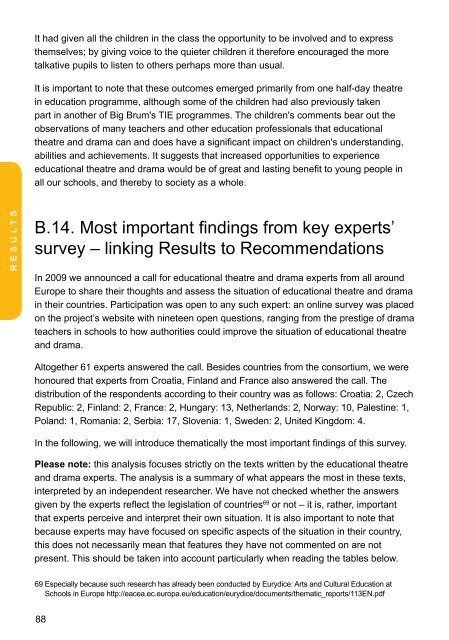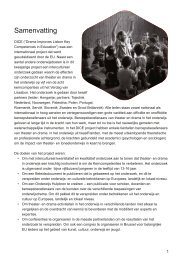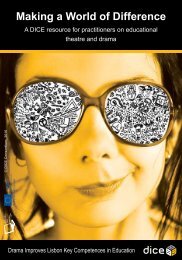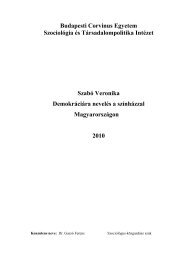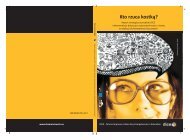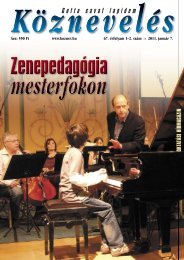Policy Paper - Drama Improves Lisbon Key Competences in Education
Policy Paper - Drama Improves Lisbon Key Competences in Education
Policy Paper - Drama Improves Lisbon Key Competences in Education
You also want an ePaper? Increase the reach of your titles
YUMPU automatically turns print PDFs into web optimized ePapers that Google loves.
It had given all the children <strong>in</strong> the class the opportunity to be <strong>in</strong>volved and to express<br />
themselves; by giv<strong>in</strong>g voice to the quieter children it therefore encouraged the more<br />
talkative pupils to listen to others perhaps more than usual.<br />
1. Supportive and obstructive factors <strong>in</strong> the work and expansion of<br />
educational theatre and drama<br />
R e s u l t s<br />
It is important to note that these outcomes emerged primarily from one half-day theatre<br />
<strong>in</strong> education programme, although some of the children had also previously taken<br />
part <strong>in</strong> another of Big Brum's TIE programmes. The children's comments bear out the<br />
observations of many teachers and other education professionals that educational<br />
theatre and drama can and does have a significant impact on children's understand<strong>in</strong>g,<br />
abilities and achievements. It suggests that <strong>in</strong>creased opportunities to experience<br />
educational theatre and drama would be of great and last<strong>in</strong>g benefit to young people <strong>in</strong><br />
all our schools, and thereby to society as a whole.<br />
B.14. Most important f<strong>in</strong>d<strong>in</strong>gs from key experts’<br />
survey – l<strong>in</strong>k<strong>in</strong>g Results to Recommendations<br />
In 2009 we announced a call for educational theatre and drama experts from all around<br />
Europe to share their thoughts and assess the situation of educational theatre and drama<br />
<strong>in</strong> their countries. Participation was open to any such expert: an onl<strong>in</strong>e survey was placed<br />
on the project’s website with n<strong>in</strong>eteen open questions, rang<strong>in</strong>g from the prestige of drama<br />
teachers <strong>in</strong> schools to how authorities could improve the situation of educational theatre<br />
and drama.<br />
Altogether 61 experts answered the call. Besides countries from the consortium, we were<br />
honoured that experts from Croatia, F<strong>in</strong>land and France also answered the call. The<br />
distribution of the respondents accord<strong>in</strong>g to their country was as follows: Croatia: 2, Czech<br />
Republic: 2, F<strong>in</strong>land: 2, France: 2, Hungary: 13, Netherlands: 2, Norway: 10, Palest<strong>in</strong>e: 1,<br />
Poland: 1, Romania: 2, Serbia: 17, Slovenia: 1, Sweden: 2, United K<strong>in</strong>gdom: 4.<br />
In the follow<strong>in</strong>g, we will <strong>in</strong>troduce thematically the most important f<strong>in</strong>d<strong>in</strong>gs of this survey.<br />
Exist<strong>in</strong>g supportive factors – <strong>in</strong> general:<br />
1. <strong>in</strong>ner motivation, personal skills, conviction;<br />
2. enthusiastic work, <strong>in</strong>dividual <strong>in</strong>itiative;<br />
3. supportive, experienced and dedicated teachers and senior management <strong>in</strong> schools;<br />
4. theatre and drama pedagogues, teachers and senior lecturers <strong>in</strong> higher education;<br />
5.Master of Arts courses at recognised universities, regular courses <strong>in</strong> teachers’<br />
tra<strong>in</strong><strong>in</strong>g, departments specialised <strong>in</strong> educational theatre and drama, quality teach<strong>in</strong>g<br />
materials;<br />
6. work of NGOs, civil associations, theatre companies, national theatre and drama<br />
associations;<br />
7. supportive theatres, arts centres, arts councils;<br />
8. state f<strong>in</strong>ancial subsidies, private sponsorship, national/<strong>in</strong>ternational project money;<br />
9. annual educational theatre and drama festivals, expert workshops, special<br />
publications, presence <strong>in</strong> media (articles, <strong>in</strong>terviews, films).<br />
Exist<strong>in</strong>g obstructive factors – <strong>in</strong> general:<br />
1. low motivation of decision-makers,<br />
2. low motivation of teachers, lack of parental engagement with educational theatre and<br />
drama issues;<br />
3. municipalities not tak<strong>in</strong>g drama seriously, not acknowledg<strong>in</strong>g its impact on children;<br />
4. dom<strong>in</strong>ance of traditional teach<strong>in</strong>g methods <strong>in</strong> schools, little re-th<strong>in</strong>k<strong>in</strong>g of pedagogy<br />
and methodology;<br />
5. low prestige of theatre and drama as a ma<strong>in</strong>stream school-subject;<br />
6. lack of university courses focus<strong>in</strong>g on educational theatre and drama, low quality of<br />
exist<strong>in</strong>g teachers’ tra<strong>in</strong><strong>in</strong>g courses;<br />
7. poor f<strong>in</strong>ancial support and subsidy of educational theatre and drama;<br />
8. lack of systematic research, external evaluation and feedback.<br />
R e s u l t s<br />
Please note: this analysis focuses strictly on the texts written by the educational theatre<br />
and drama experts. The analysis is a summary of what appears the most <strong>in</strong> these texts,<br />
<strong>in</strong>terpreted by an <strong>in</strong>dependent researcher. We have not checked whether the answers<br />
given by the experts reflect the legislation of countries 69 or not – it is, rather, important<br />
that experts perceive and <strong>in</strong>terpret their own situation. It is also important to note that<br />
because experts may have focused on specific aspects of the situation <strong>in</strong> their country,<br />
this does not necessarily mean that features they have not commented on are not<br />
present. This should be taken <strong>in</strong>to account particularly when read<strong>in</strong>g the tables below.<br />
69 Especially because such research has already been conducted by Eurydice: Arts and Cultural <strong>Education</strong> at<br />
Schools <strong>in</strong> Europe http://eacea.ec.europa.eu/education/eurydice/documents/thematic_reports/113EN.pdf<br />
88<br />
89


